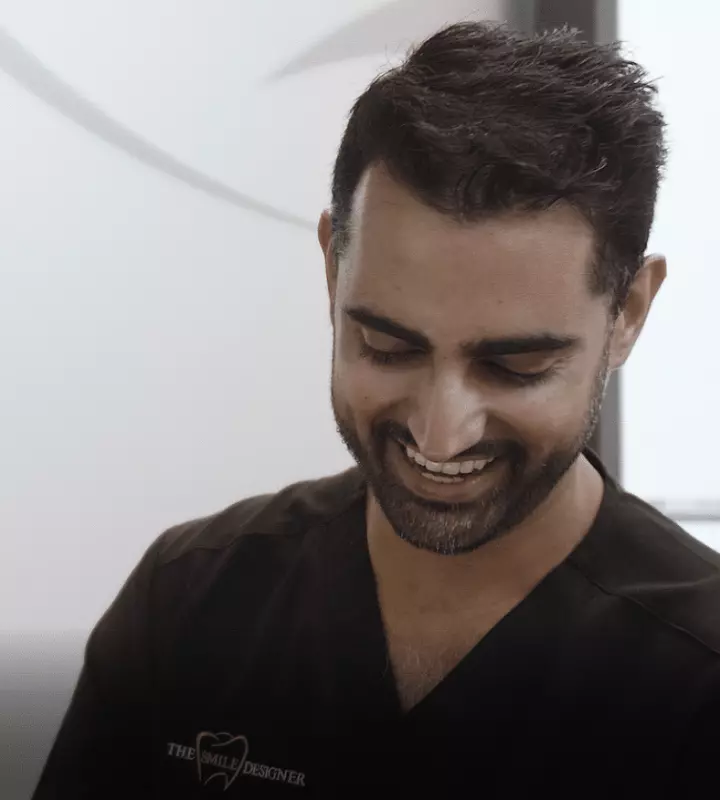The Complete Guide On Dental Veneers
Dental veneers are a popular option for people who are looking to improve their smiles. They can be used to correct a variety of dental problems, including crooked teeth, stained teeth, and chipped teeth. This blog post will discuss everything you need to know about dental veneers. We will cover the following topics: what veneers are, how they are made, the benefits of getting them, and the cost. We will also provide you with a list of questions you should ask your dentist before getting them. So, whether you are considering dental veneers or just want to learn more about them, this blog post is for you!
What are dental veneers, and what do they do for your teeth
Dental veneers are thin, custom-made shells that cover the front surface of your teeth. They can be used to improve the appearance of your teeth and protect them from further damage.
Veneers are made from porcelain or composite resin, which is a durable material that looks like natural tooth enamel.
There are several reasons why you might consider getting dental veneers in melbourne. Maybe you have teeth that are stained or discoloured, and whitening treatments haven’t worked. Or, you may have cracks or chips in your teeth that you want to cover up. Dental veneers can also be used to close gaps between teeth or to make your teeth look longer.
If you’re considering dental veneers, it’s essential to know that they are not suitable for everyone.
Before getting veneers, be sure to talk to your dentist about
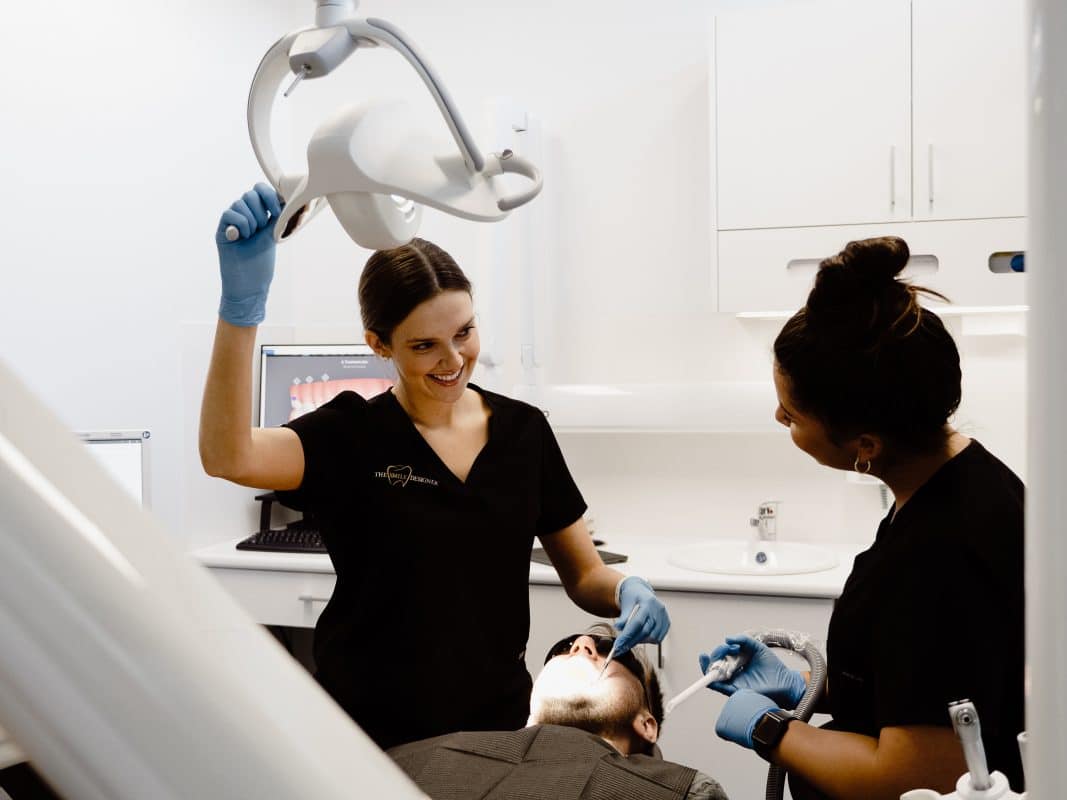
What are the different types of Dental Veneers?
Dental veneers are a popular way to improve the appearance of teeth. They are thin, custom-made shells that are designed to cover the front surface of teeth. Veneers can be made from porcelain or composite resin and are usually used to treat teeth that are discoloured, chipped, or misshapen teeth. When considering veneers, composite and porcelain are two of the most popular materials. Both have their own unique benefits that can make them ideal for different situations. So, what’s the difference between composite veneers and porcelain?

Composite Veneers
Composite veneers are made from a plastic resin that is matched to the colour of your teeth. They are then bonded to the front surface of your teeth using a unique adhesive. Composite veneers are less expensive than porcelain veneers and can be completed in just one office visit. However, they are not as durable as porcelain veneers and may require more frequent replacement.
Porcelain Veneers
Porcelain veneers are made from a thin layer of ceramic that is tinted to match the natural colour of your teeth. Porcelain veneers are stronger and more durable than composite veneers and can resist staining and discolouration. However, they are also more expensive than composite veneers and may require two or more office visits to complete.
Composite veneers are generally best for small cosmetic changes, while porcelain veneers are better for more extensive changes or corrections.
The benefits of getting dental veneers
Veneers are more than just a cosmetic treatment; they can also provide numerous dental health benefits. Here are some of the top reasons to consider getting dental veneers:
Veneers can help to protect your natural teeth from wear and tear. If you have weak or damaged teeth, veneers can provide an extra layer of protection. They can also help to prevent further tooth damage by protecting the enamel from staining and erosion.
Veneers can also improve your oral health by correcting some common dental problems. For example, veneers can close up the spaces if you have gaps in your teeth. If you have misshapen or crooked teeth, veneers can also help to correct the alignment. In some cases, veneers can even help to strengthen weak teeth.
Finally, dental veneers can give you a brand-new smile that you’ll be proud to show off. If you’re unhappy with the appearance of your teeth, veneers can give you the confidence
boost you need. With today’s advanced technology, veneers can look completely natural. No one will be able to tell that you have them unless you tell them!
How to get dental veneers – the process involved.
The first step in getting dental veneers is to schedule a consultation with your dentist. During the consultation, your dentist will examine your teeth and discuss your goals for treatment. If you decide to move forward with veneers, your dentist will take impressions of your teeth and send them to a dental lab. The lab will then create custom veneers that match the shape and colour of your natural teeth. While you wait for your veneers to be ready, your dentist will provide you with temporary veneers. Once the veneers are prepared, you will return to the dentist’s office for a second appointment. The procedure of inserting your veneers will take a couple of hours. During this appointment, your dentist will clean your teeth and roughen up their surfaces so the veneers will adhere properly. Next, the veneers will be applied to your teeth using a unique adhesive. Once in place, your dentist will use a light to harden the adhesive and ensure a secure bond. Any final adjustments are made to ensure a comfortable and natural fit. Finally, you will be able to see your new and improved smile!
What to expect after getting dental veneers?
At first, your teeth may feel sensitive to hot and cold drinks or food. This is normal and will subside within a few days. To help with the sensitivity, we recommend using Sensodyne toothpaste for the first few days. You may also notice that your bite feels different. This is because the veneers are slightly thicker than your natural teeth. Your brain will quickly adjust to the new sensations, and you will get used to the new veneers within a few days. We also recommend avoiding hard and chewy foods for the first few days, which can cause the veneers to come off. After a week or so, you will be able to eat whatever you want without any problems. If you have any questions or concerns, please don’t hesitate to contact our office. We’re always happy to help!
What risks are associated with dental veneers, and how can you avoid them?
Though dental veneers are considered a safe and effective way to improve the appearance of your smile, However, like all dental procedures, there are some risks associated with veneers. In some cases, the bonding process can damage the tooth enamel, making it more susceptible to decay. There is also a risk of developing gum disease if the veneers are not correctly placed. To avoid these risks, it is important to consult with an experienced dentist who can determine if veneers are right for you. Once you have decided to proceed with the procedure, be sure to follow your dentist’s instructions for caring for your veneers to ensure a long-lasting and successful result.
How to care for your new dental veneers
Caring for your new dental veneers is essential to ensure they last for many years. Here are a few tips on how to care for your new veneers:
- Brush and floss your teeth twice daily, just as you would with your natural teeth. Be sure to use non-abrasive toothpaste so as not to damage the veneers.
- Avoid biting or chewing on complex objects, as this can damage the veneers.
- Avoid stain-causing foods and drinks, such as coffee, tea, and red wine. If you do consume these items, be sure to brush your teeth soon afterwards.
- Visit your dentist regularly for check-ups and cleanings. Your dentist will also be able to spot any problems with the veneers early on and treat them before they become serious.
- By following these simple tips, you can help ensure that your dental veneers will last many years.

How much do dental veneers cost, on average, and how long do they last?
The cost of dental veneers varies depending on the type of veneer and the number of veneers needed. Porcelain veneers tend to be more expensive than composite veneers. On average, dental veneers cost between $500 and $1,800 per tooth, depending on the material you get. The number of veneers needed will also affect the total cost. For example, a patient who needs four veneers will have a higher total cost than a patient who needs just one veneer.
With proper care, dental veneers can last for many years. Porcelain veneers, in particular, are known for their longevity. Dental veneers typically last for 10 to 15 years before they need to be replaced. However, they can last longer with proper care. It is important to avoid chewing hard objects, such as ice or hard candy, which can damage the veneers. In addition, it is important to prevent clenching or to grind your teeth, as this can also damage the veneers. Your dentist will recommend a night guard to protect your teeth if you grind or clench at night.
Why do veneers need to be replaced?
While veneers are very durable, they are not indestructible. Over time, they can become stained or damaged, just like natural teeth. When this happens, they will need to be replaced. Veneers typically last for ten to fifteen years before they need to be replaced. In some cases, they may last even longer, though this can vary depending on the individual’s oral habits and how well they take care of their teeth. Over time, the bond between the veneer and tooth can begin to break down, allowing bacteria to enter and causing decay.
Additionally, the porcelain can become stained or chipped, making it necessary to replace the veneer in order to restore a natural-looking smile. Though they may not last forever, veneers can be a great way to improve the appearance of your teeth and give you the confidence to show off your smile. When the time comes to replace them, you will need to consult with your dentist to discuss your options.
Alternative to dental veneers
There are several alternative treatments to dental veneers. These include dental bonding, tooth reshaping, and enamel contouring. Dental bonding is a procedure in which tooth-coloured resin is bonded to the front surface of the teeth. This can be used to improve the appearance of chipped, cracked, or discoloured teeth. Tooth reshaping involves using a laser or diamond instrument to remove small amounts of enamel from the teeth. This can be used to change the shape, length, or width of the teeth. Enamel contouring is a procedure in which small amounts of enamel are removed from the teeth to improve their overall appearance. These alternative treatments to dental veneers can provide patients with the results they are looking for without the need for costly and invasive procedures. Crowns are applied to chipped, broken, or misshapen teeth to improve their appearance and function. Dental bridges are used to replace one or more missing teeth by attaching artificial teeth to the adjacent natural teeth. Dentures are removable appliances that can be used to replace one or more missing teeth.
What is the difference between dental crowns and dental veneers?
There are a few key differences between crowns and dental veneers:
- Crowns encase the entire tooth, while veneers only cover the front surface of the tooth.
- Crowns can be made from a variety of materials (including porcelain, ceramic, metal, or composite resin), while veneers are almost always made from porcelain.
- Crowns are typically used to restore a tooth that is significantly damaged or decayed, and the tooth structure is compromised needing more protection. In contrast, veneers are generally used for cosmetic purposes.
While dental crowns and veneers can be used to improve the appearance of your smile, they each have unique advantages and disadvantages. If you are considering either of these treatments, talk to your dentist about which option is right for you.
How Veneers made using Digital Dentistry
Digital dentistry is revolutionizing the way dental veneers are made. Traditionally, dental veneers were made by hand, which was a time-consuming and expensive process. With digital dentistry, dental veneers can be made in a matter of minutes using a computer-aided design (CAD) program. This technology allows dental laboratories to create custom-made veneers that are precisely fitted to each patient’s smile.
Digital dentistry also allows for a quicker turnaround time for dental prosthetics. Some of the benefits of digital dentistry include:
- less time in the dental chair
- minor discomfort and pain for the patient
- fewer dental visits required
- more accurate dental prosthetics
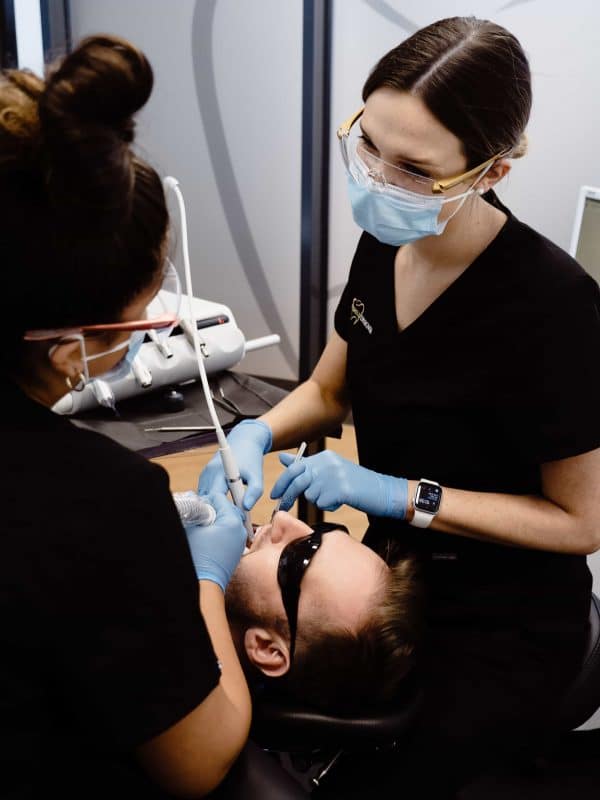
How are veneers made?
In the past, dental veneers were made using a traditional modelmaking process, which involved taking an impression of the patient’s teeth and creating a physical model. This model was then used to create a mould for the veneers. However, this process was often time-consuming and expensive. Thanks to advances in digital technology, veneers can now be made using digital dentistry. This new process is not only more affordable and quicker, but it also allows for a higher level of customization.
First, a digital scan of the patient’s teeth is taken. This scan is then used to create a 3D model of the teeth. From this model, the dentist can design the veneers to achieve the desired look. This new process is much more efficient than the old one and results in a perfect fit for the patient’s teeth. Additionally, because the veneers are made using a digital model, they can be easily reproduced if they need to be replaced. Overall, digital dentistry has revolutionized the way veneers are made, making them more affordable and accessible than ever.
Does your health insurance cover Dental Veneers?
Dental veneers are becoming increasingly popular as they offer a quick, easy way to achieve a straighter, brighter smile. While dental veneers can be an effective way to improve the aesthetics of your smile, they are considered to be a cosmetic procedure, and as such, they are not typically covered by health insurance. If you are interested in dental veneers, you should expect to pay out-of-pocket for the treatment.
While health insurance may not cover dental veneers, fortunately, there are now several payment plans for veneers. This means that you can spread the cost of your treatment over time, making it more affordable. In some cases, we can help you gain early access to superannuation funds to cover major restorative dental work.
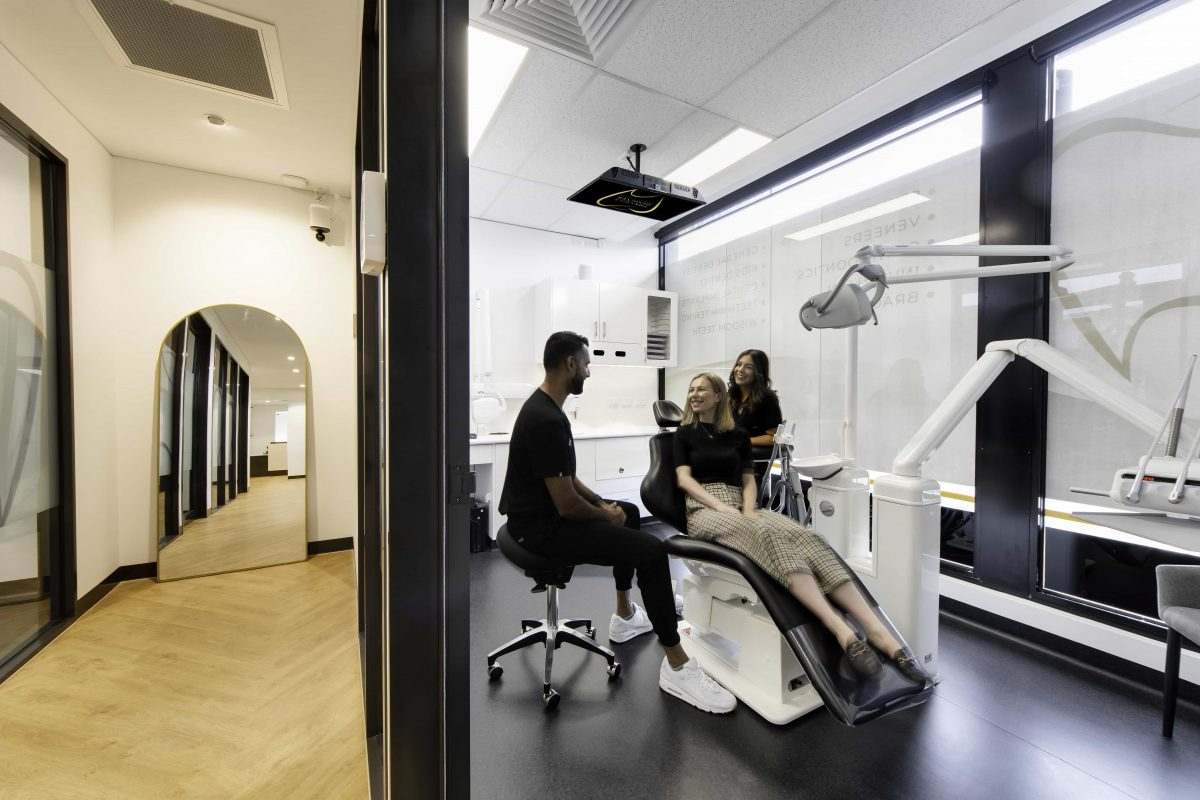
Can veneers stain?
One common question about veneers is whether or not they can stain. While traditional teeth are porous and can absorb stains from food and drink, veneers are made from a non-porous material that is resistant to staining. While porcelain is known for being resistant to staining, it is not entirely immune to it. However, it is also porous, which means that it can absorb stains. It is important to note that the bonding material used to attach veneers to the teeth is susceptible to staining. As a result, people with veneers should avoid foods and drinks that are known to cause staining, such as red wine and coffee. In addition, it is important to brush your teeth regularly and visiting your dentist for regular cleanings is important.
Can you whiten your dental Veneers?
Can Porcelain Veneers be whitened using professional teeth whitening? The simple answer is yes, but there are a few things to remember. First, it’s essential to consult with your dentist to see if whitening is right for you. While porcelain veneers are resistant to staining, they can become discoloured over time. If your veneers are still in good condition, whitening may be all you need to brighten them up. However, if your veneers are worn or damaged, you may need to replace them. Second, professional teeth whitening is not always necessary. Many over-the-counter teeth whitening products can be just as effective. Finally, remember that teeth whitening is not permanent. You may need to repeat the process every few years to maintain your bright smile.
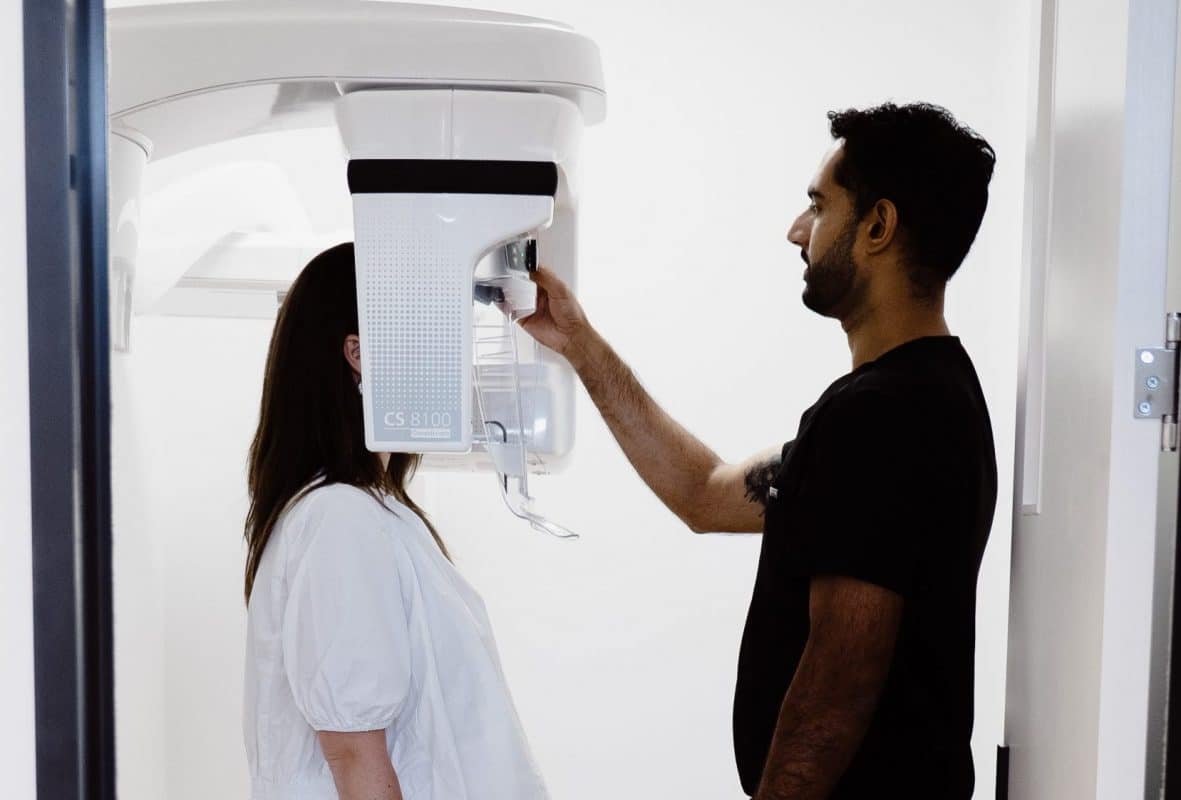
Many people opt for dental veneers to enhance their smiles. While veneers are a popular cosmetic dentistry option, there is debate about whether they are actually good for your teeth. Some people argue that veneers can damage your natural teeth, while others believe that they are a safe and effective way to improve the appearance of your smile. So, what is the truth? Do dental veneers ruin your natural teeth?
The answer may depend on how well you take care of your veneers. Veneers are made of thin porcelain shells bonded to your teeth’ front surfaces. With revolutionized technology, prepping for veneers nowadays requires less shaving of enamel, conserving your own tooth structure as much as possible.
Can you get Invisalign after Veneers?
If you are considering Invisalign in melbourne, you may be wondering if you can still get the treatment after having veneers installed. The answer is yes! You can absolutely still get Invisalign even if you have veneers. However, the process may be more difficult and expensive than if you had not gotten veneers in the first place, but it’s best to get veneers installed after the teeth have been straightened. Dental veneers are considered a cosmetic dentistry procedure; therefore, they do not rectify bite issues. So, it is still necessary to have your teeth aligned first before getting veneers. The good news is that Invisalign can be used to prep your teeth for veneers! If you are looking to get both Invisalign and veneers, we recommend that you get Invisalign first and then get veneers. Many patients are now choosing dual cosmetic treatment, preferably opting for an orthodontic solution such as Invisalign to straighten teeth and then having veneers applied to the front teeth for an instantly improved smile to improve size, shape, and colour.
If you are considering getting Invisalign and have veneers, be sure to consult with your dentist.
Do getting veneers hurt?
No, it is not painful to get dental veneers. In fact, the procedure is often described as being virtually painless. This is because your dentist will use a local anaesthetic to numb the area around your teeth before beginning the procedure. You may feel some pressure during the procedure, but you should not feel any pain. If you do experience any pain or discomfort, be sure to let your dentist know so they can take steps to alleviate it.
When you get dental veneers, your dentist will place a very thin layer of porcelain over your natural teeth. This porcelain is extremely strong and durable but can also be quite brittle. As a result, when you first get your veneers, they may be slightly more sensitive to hot and cold temperatures than your natural teeth. However, this sensitivity should go away within a few days to a week as your veneers adjust to your mouth. If you experience any prolonged or severe sensitivity after getting dental veneers, you should contact your dentist right away.
Why is tooth enamel shaved when getting veneers?
One of the most common questions patients ask when considering veneers is why their tooth enamel must be shaved down. The answer is two-fold: first, because veneers are thicker than natural tooth enamel, shaving down the enamel helps to ensure a more flush, natural-looking appearance. Second, shaving down the enamel creates a rougher surface for the veneers to adhere to. This is important because veneers are bonded to the teeth using special dental cement. If the surface of the tooth is too smooth, there is a risk that the bond between the veneer and the tooth will not be strong enough. By shaving down the enamel, dentists can create a greater surface area for the cement to grip, resulting in a stronger and more durable bond. With innovative technology nowadays, less tooth enamel is shaved off. This is good news for patients as it means that their natural teeth will be preserved as much as possible.
Will porcelain veneers increase the risk of cavities or tooth decay?
There is no definitive answer to this question as it depends on several factors. For example, how well the veneers are made and fitted will play a role in how much protection they offer to the underlying teeth. In addition, the person’s oral hygiene habits will also affect the likelihood of developing cavities or tooth decay. However, it is generally thought that porcelain veneers can help to protect teeth from damage and decay. This is because they provide a hard, smooth surface that is less likely to trap food and bacteria. In addition, veneers can also help to prevent staining and discolouration. As such, while there is no guarantee that porcelain veneers will prevent cavities or tooth decay, they do offer some level of protection. If patients brush their teeth, floss, and visit their dentist for regular dental hygiene appointments, patients’ risk of developing cavities or tooth decay should be minimized significantly
Will porcelain veneers affect my diet?
If you’re considering porcelain veneers, you may be wondering if they will affect your diet. The short answer is that porcelain veneers should not affect your diet in any way. You’ll be able to eat all the same foods you love without any problems. However, it’s essential to keep one thing in mind: Porcelain veneers, although durable, are delicate, and they can be damaged if you bite into something hard. As with natural teeth, chewing on complex, non-food objects or ice will always increase your risk of chipping a veneer. So, while you can eat whatever you want with porcelain veneers, it’s still important to be mindful of how you’re eating and what you’re biting into. With a little bit of care, your porcelain veneers will stay beautiful for years to come.

Can Veneers help with gum disease and gum recession?
While dental veneers can address some aspects of gum recession, they will not treat gum disease or gum recession itself. If your gums have already started to recede, dental veneers can help mask the problem by covering up the exposed tooth root. However, they will not stop the progression of gum recession. If you wish to recover receded gums, you may require alternative surgical treatments such as gum graft surgery.
When you have gum disease, the gums pull away from the teeth, creating pockets. Bacteria can then build up in these pockets and cause the gums to become inflamed and infected. If not treated, gum disease can lead to tooth loss. Veneers can help to prevent this by sealing off the gaps between the gum line and the teeth. This helps to reduce the risk of bacteria build-up and keeps your smile looking its best
However, it is important to note that gum disease can cause the veneers to become loose and fall off. In addition, gum disease can also cause the veneers to discolour. Therefore, it is essential to visit a dentist regularly to monitor your gums’ condition and ensure they are healthy. If your gum disease is in the early stages, your dentist may be able to treat it with a deep cleaning and prescribe medication. However, if your gum disease is in the late stages, you may need surgery to remove the diseased tissue before you can get veneers.
If you are struggling with gum disease or gum recession issues, you will need to consult with your dentist for treatment options before considering dental veneers.
Why are veneers made from porcelain?
Porcelain is one of the most robust materials available, making it an ideal choice for veneers. Porcelain is also a tough material, so it resists staining and discolouration. And because porcelain is a light-reflecting material, it gives your teeth a natural, healthy lustre.
When choosing the proper dental treatment, there are many factors to consider. One crucial factor is the toxicity of the materials used. Porcelain veneers are made from a type of ceramic that is deemed to be non-toxic. This means they are safe for use in the mouth and are not likely to cause adverse reactions. Porcelain veneers are also biocompatible, meaning that they are compatible with the tissues in the mouth and are unlikely to cause any irritation or allergic reactions. As such, porcelain veneers are considered a safe and effective option for many people looking for a way to improve their smiles.
Veneers serve as a multipurpose dental solution to several aesthetic and functional problems. At The Smile Designer Dental Studio, we are at the forefront of cosmetic dentistry in Melbourne’s inner north. If you need custom-made, high-quality veneers contact our experienced staff today or book online for a complimentary smile makeover consultation to start your smile journey today.




















